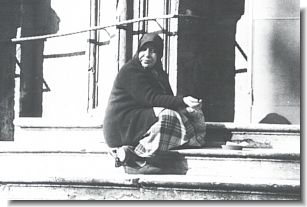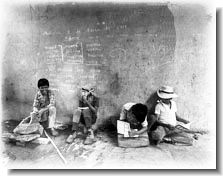|
The lack of family
 In the last few years the universe of the homeless has seen many transformations. So-called tramps are just a small part of them. In fact, more and more often we encounter people with a seemingly normal past who are on the street because of dramatic yet not extraordinary events. They could be old people following an eviction notice; adults after a separation from their husband or wife, drawn away from the family after not finding an alternative place to stay; young people after loosing their job; foreigners coming from developing countries. What follows is that in the last few years the composition of these phenomena has been great diversifying. The average age of the homeless is also decreasing, shown especially in growing presence of young people on the street. In the last few years the universe of the homeless has seen many transformations. So-called tramps are just a small part of them. In fact, more and more often we encounter people with a seemingly normal past who are on the street because of dramatic yet not extraordinary events. They could be old people following an eviction notice; adults after a separation from their husband or wife, drawn away from the family after not finding an alternative place to stay; young people after loosing their job; foreigners coming from developing countries. What follows is that in the last few years the composition of these phenomena has been great diversifying. The average age of the homeless is also decreasing, shown especially in growing presence of young people on the street.
For many people the crisis begins and coincides in large part with an absent family, which either has never been a family or one that cannot go on any more. And the deterioration of family relationships is really the reason why many people are forced to go and live on the street. Without doubt, this is by far the main reason with which the homeless explain their arrival and their stay on the street: family represents a fundamental knot, if not the only, one to solve the puzzle of many stories.
 Stories of incomprehension and break-up leave impalpable signs in the lives of everybody, especially in the homeless: their family recollection is connected to the memory of a more or less regulated and stable life. In their recollection the wound of the loss of their objects of affection and also of the loss a micro-welfare remains nevertheless unhealed. Stories of incomprehension and break-up leave impalpable signs in the lives of everybody, especially in the homeless: their family recollection is connected to the memory of a more or less regulated and stable life. In their recollection the wound of the loss of their objects of affection and also of the loss a micro-welfare remains nevertheless unhealed.
Alcoholism, drug dependence, psychical illness, unemployment are heavy social problems which the family can sustain only relatively: there is a hard ridge, along which tragic stories of incomprehension, delusions, tensions, fears and sometimes out and out dramas occur and develop. More often situations of heavy tension are sorted out with the voluntary or obliged drawn away by some member of the family. What kind of alternatives are there? This generally is the beginning of a way without future.
The women's street
Life on the street is tough and dangerous. This is the reason why we encounter more men than women. However the presence of women is widespread, considering the heavy hardship of the homeless life. In fact, on the street the equal rights of men and women is not a conquest but an obligation imposed by the survival necessity. People must live and defend themselves like a man, but the struggle is often unequal and, because of this, women are disadvantaged twice. Loneliness represents a risk besides being a weight.
|
![]()
